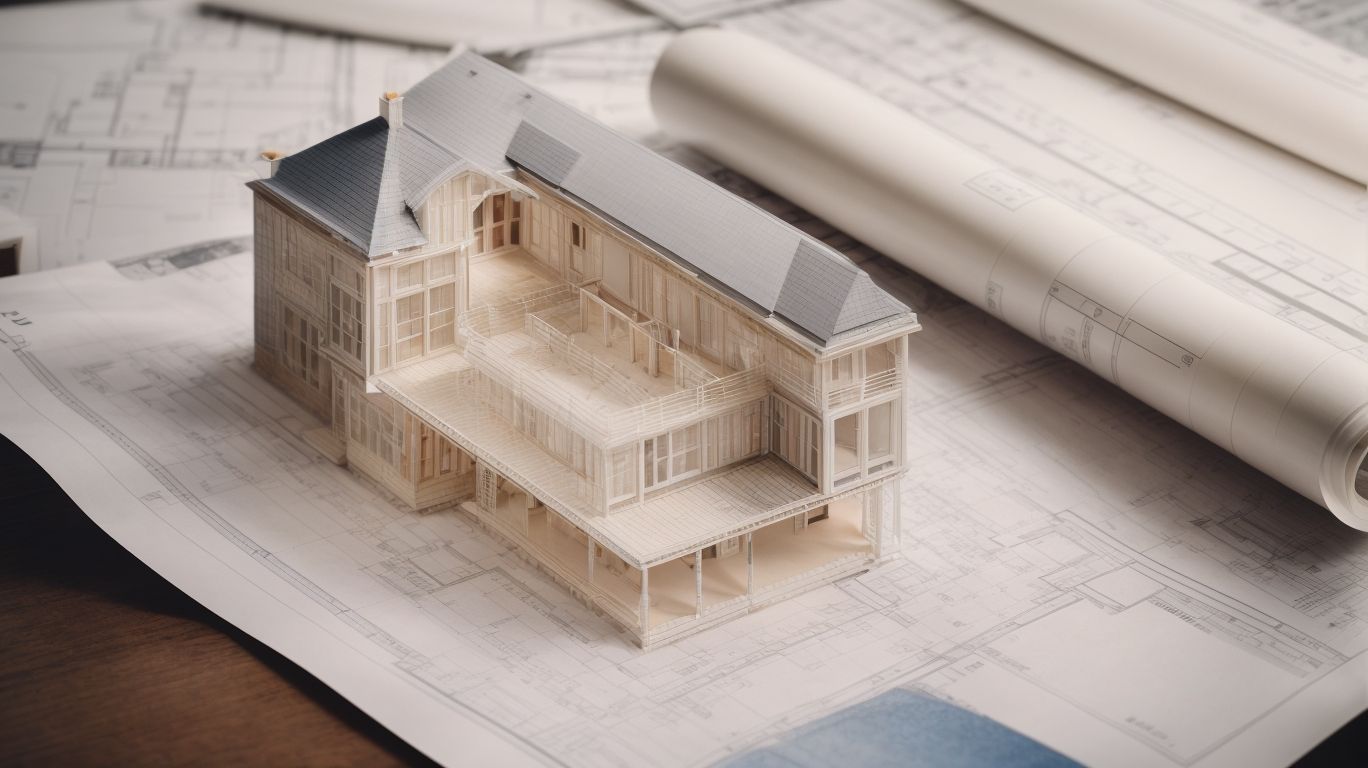
Checklist for Evaluating Structural Engineering Professionals
If you’re considering a construction project, whether it’s a new building or a renovation, hiring a structural engineering professional is crucial to ensure its success.
But how do you know if the engineer you’re considering is the right fit for your project? In this article, we’ll discuss the qualifications and key skills you should look for in a structural engineering professional.
We’ll also provide a checklist of questions to ask and red flags to watch out for when evaluating potential candidates. By the end of this article, you’ll have a clear understanding of what to consider when hiring a structural engineering professional for your next project.
What Is Structural Engineering?
Structural engineering involves the analysis, design, and construction of various types of structures, ensuring their safety, stability, and durability under different environmental conditions and loads.
Structural engineering is a vital aspect of infrastructure development, encompassing buildings, bridges, dams, and other impressive architectural feats. This field also involves assessing the effects of natural forces like earthquakes, wind, and snow on structures.
Professionals in structural engineering rely on cutting-edge technology and software to evaluate the strength of materials and ensure that structures can withstand expected stresses. When considering the qualifications of structural engineering experts, it’s crucial to assess their proficiency in areas such as finite element analysis, seismic design, and compliance with building codes.
Why Is It Important to Hire a Structural Engineering Professional?
Hiring a structural engineering professional is crucial for ensuring the successful execution and management of construction projects. They possess the essential skills, expertise, and experience to address complex structural challenges and deliver optimal solutions.
The role of structural engineers in project management is crucial. They are responsible for overseeing the entire structural aspect of a project, ensuring that it complies with safety codes and regulations. Their problem-solving abilities are essential in identifying, analyzing, and resolving any structural issues that may arise during construction. This greatly contributes to the overall efficiency and integrity of the project.
With their technical expertise and strong communication skills, structural engineers are able to collaborate effectively with architects, contractors, and stakeholders. This ensures seamless integration of structural design with the overall project goals. Their critical thinking skills and extensive project portfolio further demonstrate their ability to handle diverse and intricate structural requirements with precision and ingenuity.
What Are the Risks of Not Hiring a Structural Engineering Professional?
Failure to engage a qualified structural engineering professional increases the risk of structural inadequacies, non-compliance with building codes, compromised integrity, and potential hazards such as inadequate seismic design or insufficient load-bearing capacity, leading to subpar project outcomes and safety concerns.
Without the expertise of a structural engineering professional, there is a heightened probability of overlooking critical risk assessments, resulting in unanticipated structural vulnerabilities.
The absence of rigorous quality assurance measures could lead to a higher likelihood of construction defects and compromised durability. Disregarding compliance requirements may result in legal repercussions and additional costs for retroactive modifications.
Ultimately, the structural performance may suffer, jeopardizing the long-term stability and safety of the built environment.
What Qualifications Should a Structural Engineering Professional Have?
A competent structural engineering professional should possess a combination of formal education, specialized training, relevant licensure, certifications, and substantial practical experience, enabling them to address diverse structural challenges and complexities effectively.
Structural engineers typically have a bachelor’s or master’s degree in civil engineering or structural engineering. Their coursework covers structural analysis, design, and applied mechanics.
It is important for structural engineers to obtain professional certifications, such as Professional Engineer (PE) or Structural Engineering Professional (SE), and to be members of organizations like the Structural Engineering Institute (SEI). These credentials demonstrate their expertise in the field.
Practical experience through internships, apprenticeships, and project involvement in areas such as seismic design, steel structures, or reinforced concrete also helps to solidify their professional credentials.
Education and Training
A solid foundation in structural analysis, design principles, construction management, and risk assessment forms the cornerstone of the educational and training requirements for aspiring structural engineering professionals, equipping them with the necessary knowledge and skills for the field.
This comprehensive educational background allows engineers to understand the behavior of structures under various loads, ensuring the safety and integrity of the built environment.
Training in design capabilities enables them to create efficient and innovative structural solutions, while proficiency in risk assessment equips them to evaluate potential hazards and implement appropriate mitigation strategies.
Education in construction management provides crucial insights into project coordination, budgeting, and scheduling, essential for overseeing the successful execution of structural projects.
Together, these elements form a strong educational and training foundation that prepares structural engineers to address the complex challenges of their profession.
Licensure and Certifications
Obtaining the appropriate licensing and industry-recognized certifications demonstrates a structural engineering professional’s commitment to upholding industry standards, ensuring code compliance, and adhering to the highest professional and ethical benchmarks.
These credentials not only validate the engineer’s expertise but also signify their dedication to continuous learning and maintaining proficiency in the dynamic field of structural engineering.
Licensure and certifications serve as a mark of assurance for clients and stakeholders, providing confidence in the engineer’s ability to deliver safe and compliant designs. They contribute to the enhancement of public safety by ensuring that engineering projects meet stringent quality and regulatory requirements, thereby fostering trust and credibility within the industry.
Experience and Specializations
Accumulated practical experience, demonstrated through a comprehensive project portfolio and strong references, alongside relevant licensing and certifications, distinguishes a competent structural engineering professional. This showcases their capability to handle diverse projects with efficiency and expertise.
This combination of experience and qualifications allows them to assess and mitigate potential risks, develop innovative solutions, and ensure compliance with industry standards and regulations.
Specialized knowledge in areas such as earthquake engineering, structural dynamics, or sustainable design further enhances a structural engineer’s ability to meet the unique demands of each project. These strengths are crucial in instilling confidence in clients and stakeholders, emphasizing the value of a well-rounded and skilled professional in the field of structural engineering.
What Are the Key Skills of a Structural Engineering Professional?
A proficient structural engineering professional exhibits a range of vital skills, including exceptional analytical abilities, critical thinking, attention to detail, efficient project management, effective communication, extensive technical knowledge, and adept problem-solving capabilities, all of which are essential for successful project execution and structural integrity.
Engineers possess a set of core skills that are crucial for their success in the field. These skills include the ability to analyze complex structural challenges, come up with innovative solutions, and effectively communicate with interdisciplinary teams.
One of the key strengths of engineers is their analytical prowess, which allows them to carefully assess different design options, anticipate potential risks, and optimize structural performance. Additionally, their critical thinking skills are essential in evaluating structural integrity, identifying vulnerabilities, and developing robust retrofitting strategies.
However, it’s not just technical abilities that make engineers valuable. Their aptitude for effectively communicating complex concepts to stakeholders and collaborating with architects, construction teams, and clients is crucial for seamless project delivery and ensuring client satisfaction.
Analytical and Problem-solving Skills
Strong analytical skills and proficient problem-solving abilities enable structural engineering professionals to navigate complex engineering challenges, conduct comprehensive structural analyses, and devise innovative solutions to address diverse structural requirements and constraints effectively.
Analyzing the structural integrity of buildings, bridges, and other infrastructure requires essential skills. This includes ensuring that these structures can withstand different loads and environmental stresses.
Moreover, the ability to identify and resolve structural issues is crucial in optimizing designs for cost-effectiveness and safety. Problem-solving skills also play a vital role in addressing unexpected complications, contributing to the efficient and sustainable development of infrastructure projects.
Attention to Detail
Meticulous attention to detail is paramount for ensuring the precision, accuracy, and quality assurance in the design, analysis, and construction processes undertaken by structural engineering professionals, minimizing the risk of errors and discrepancies.
This attention to detail is vital in every stage, from the initial conceptualization to the final execution of a project.
By meticulously examining every aspect, such as material properties, load conditions, and potential stress points, structural engineers can ensure that the structures they design and build meet safety, durability, and functionality standards.
This focus on detail fosters innovation and creative problem-solving, allowing engineers to optimize designs for maximum efficiency and performance, ultimately enhancing the overall quality of the built environment.
Communication and Collaboration Skills
Robust communication and collaboration skills, coupled with effective team leadership, facilitate seamless coordination, transparent reporting, and meticulous documentation throughout the project lifecycle. This ensures efficient project execution and successful outcomes for all stakeholders involved.
Effective communication and collaboration are crucial skills in structural engineering. This field involves multidisciplinary teams working together to design, build, and maintain complex infrastructure. By ensuring that all team members, including architects, engineers, and construction professionals, are aligned in their goals and working in harmony towards a common objective, projects can be completed successfully.
In addition, clear reporting and documentation are essential in conveying crucial project information. This allows all parties involved to have access to the necessary details for making informed decisions and maintaining project quality and safety standards. By breaking down communication barriers and promoting effective collaboration, structural engineers can ensure the success of their projects.
Knowledge of Building Codes and Regulations
In-depth knowledge of building codes, regulatory requirements, and safety protocols is indispensable for ensuring strict adherence to code compliance, regulatory standards, and the implementation of robust safety measures in structural engineering projects. This safeguards the integrity and safety of the built environment.
This understanding is crucial as it guides the design, construction, and maintenance of buildings to meet specific safety and performance criteria.
Building codes set out the minimum requirements to safeguard public health, safety, and general welfare. Compliance ensures that structures are resistant to natural disasters, capable of supporting the intended loads, and provide adequate means of egress. Adherence to the codes also contributes to the environmentally sustainable construction, promoting energy efficiency and resilience in the built environment.
What Questions Should You Ask When Evaluating a Structural Engineering Professional?
When evaluating a structural engineering professional, it is imperative to inquire about their project portfolio, professional references, proficiency in project management, communication skills, adherence to industry standards, and expertise in construction management to assess their qualifications and capabilities effectively.
When evaluating potential structural engineers, it’s important to consider their experience with structural analysis and design, familiarity with different building materials and construction techniques, and ability to troubleshoot and solve complex structural issues. It’s also crucial to assess their knowledge of local building codes and regulations.
Additionally, examining their past projects for innovation, sustainability, and cost-effectiveness can provide valuable insight into their problem-solving skills and creative approach to engineering challenges.
Can You Provide Examples of Your Past Projects?
Requesting examples of past projects allows you to gauge the structural engineering professional’s project portfolio, successful endeavors, and problem-solving capabilities when confronted with various engineering challenges. This provides valuable insights into their expertise and qualifications.
When selecting a structural engineering professional for new projects, it is essential to assess their past projects’ complexity and scale. This demonstrates their adaptability and ability to handle diverse structural and design challenges. Additionally, evaluating their previous innovative solutions provides insight into their problem-solving skills and approach. These assessments are crucial in reinforcing their track record of delivering sound and sustainable engineering solutions.
How Do You Stay Updated on Industry Developments?
Inquiring about the structural engineering professional’s approach to staying abreast of industry developments, engaging in continuous professional development, and assimilating technological advancements provides valuable insights into their commitment to ongoing learning and adaptability within the dynamic engineering landscape.
Staying updated on industry developments is crucial for a structural engineering professional. It ensures they are equipped with the latest knowledge and skills to tackle complex projects effectively.
Continuous professional development enables them to expand their expertise, stay current with regulations and best practices, and enhance their problem-solving abilities. Embracing technological advancements such as Building Information Modeling (BIM) and advanced structural analysis software is essential for optimizing designs and streamlining project workflows. The ability to integrate these developments into their work showcases their commitment to excellence and staying ahead in the field.
How Do You Manage Project Budgets and Timelines?
Understanding the structural engineering professional’s approach to project budgeting, timeline management, efficiency, and innovative solutions provides critical insights into their capacity to optimize project resources, meet deadlines, and foster innovative practices to enhance project outcomes.
Evaluating their ability to forecast and allocate resources effectively within the given budget, adhere to project schedules, and introduce creative solutions for complex engineering challenges is fundamental in ensuring the successful execution of construction projects.
This assessment equips stakeholders with the assurance that the selected structural engineering professional possesses the necessary skills to navigate the intricacies of project management and deliver high-quality, sustainable structures.
How Do You Communicate with Clients and Other Professionals Involved in a Project?
Evaluating the structural engineering professional’s communication approach with clients and project collaborators offers insights into their ability to foster client satisfaction, seamless collaboration, transparent reporting, and meticulous documentation, contributing to efficient project management and successful project outcomes.
Effective communication skills enable engineers to clearly convey complex technical information to clients, enhancing understanding and trust. Collaborative communication fosters seamless coordination with architects, contractors, and other team members, leading to streamlined project execution.
Proficient reporting and documentation ensure clarity and compliance, laying a strong foundation for successful project outcomes and satisfied clients.
What Are the Red Flags to Look Out for When Evaluating a Structural Engineering Professional?
When evaluating a structural engineering professional, red flags may include inadequate qualifications, lack of experience, poor communication skills, limited understanding of building codes, and reluctance to provide references or examples of past projects, signaling potential deficiencies in their expertise and capabilities.
These red flags are crucial indicators that may point to underlying issues in the professional’s ability to deliver quality structural engineering services.
Insufficient qualifications could lead to a lack of technical knowledge and may compromise the safety and integrity of the structures they work on. “Quality structural engineering services require a strong foundation of expertise and qualifications.”
Lack of experience might result in an inability to anticipate and address complex challenges in structural projects, raising concerns about the reliability of their solutions. “Experience is key in navigating the complexities of structural engineering projects.”
Poor communication skills can impede effective collaboration with clients and other project stakeholders, potentially leading to misunderstandings and errors in the design or construction process. “Clear and effective communication is essential for successful structural engineering projects.”
Therefore, it is essential for clients and project managers to carefully consider these warning signs when selecting a structural engineering professional. “Don’t overlook these red flags when choosing a structural engineering professional for your project.”
Lack of Proper Qualifications or Experience
A lack of proper qualifications, insufficient experience, inadequate credentials, or a track record of incomplete projects and non-compliance with industry standards may raise significant concerns when evaluating the competency and reliability of a structural engineering professional.
These warning signs can lead to issues such as compromised structural integrity, safety hazards, and legal liabilities. Clients and stakeholders rely on structural engineers to ensure that buildings and infrastructure are designed and constructed with precision and adherence to codes and regulations.
When there are doubts about an engineer’s qualifications or track record, it can jeopardize the successful completion of projects and put lives and investments at risk. It’s essential for structural engineers to maintain a high level of expertise and integrity in their work to uphold professional standards and safeguard public safety.
Poor Communication Skills
Poor communication skills can create challenges in fostering client satisfaction, facilitating effective collaboration, and demonstrating competent team leadership. These concerns may raise doubts about the structural engineering professional’s ability to manage projects and engage with stakeholders adequately.
This can result in dissatisfaction among clients, leading to strained relationships and potential loss of future projects. It also impedes smooth collaboration with other professionals involved in the project, hindering overall progress.
Ineffective communication can also undermine the professional’s ability to lead and motivate their team, impacting the project’s efficiency and timeliness. Addressing these communication shortcomings is critical for the success and reputation of the structural engineering professional.
No Understanding of Local Building Codes and Regulations
A lack of understanding or adherence to local building codes, regulatory requirements, and safety protocols may signify a critical deficiency in the structural engineering professional’s ability to ensure code compliance, regulatory adherence, and the implementation of robust safety measures, posing potential risks to project outcomes and structural integrity.
As structural engineering professionals, it is crucial to showcase a thorough understanding of building codes and regulations. This is essential in mitigating potential hazards and ensuring the stability and safety of construction projects. Non-compliance with these standards not only jeopardizes the integrity of structures but also poses a risk to the lives of occupants and the public.
Furthermore, failure to adhere to building codes and regulatory requirements can lead to legal liabilities and financial consequences for both professionals and their clients. This highlights the importance of having a comprehensive knowledge of this aspect of structural engineering practice.




No Comments